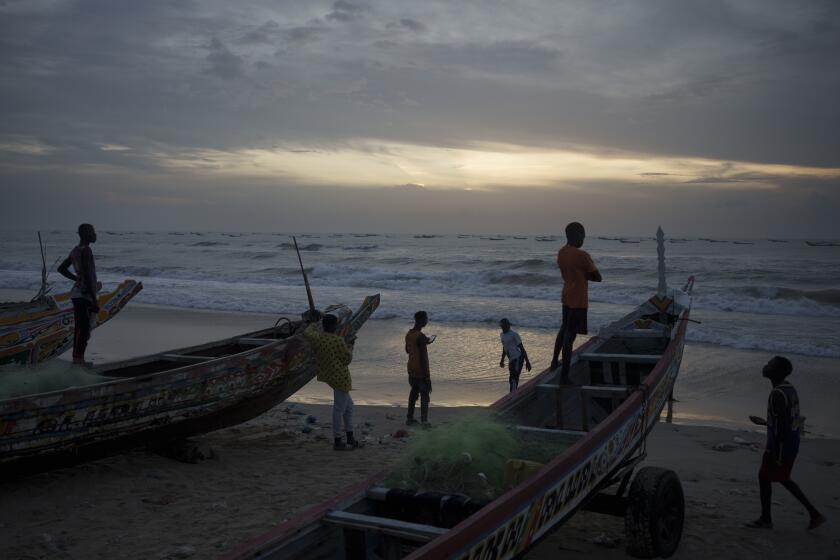Georgian vote shifted to January
Georgian President Mikheil Saakashvili eased the crisis that has gripped his country for a week by pledging Thursday to hold presidential elections and a referendum on voting for a new parliament on Jan. 5.
A day after the pro-Western government’s democratic credentials were badly bruised by a violent crackdown against thousands of opposition demonstrators, Saakashvili surprised even his opponents by agreeing to go to the polls in less than two months.
Opposition leaders called off further demonstrations, and the protests that have swept the capital since Nov. 2, when 70,000 people occupied the street outside parliament, appeared to be nearing an end. With hundreds of soldiers blocking off streets in Tbilisi, the capital, schools closed and independent news broadcasts shut down, government officials signaled that the 15-day state of emergency declared Wednesday could be lifted sooner if calm prevails.
“What happened yesterday is what we wanted to avoid: to cast a shadow on Georgia and its international position, something which we wanted to avoid at all costs,” Saakashvili said in a televised address.
“I made the decision to move the date of presidential elections to Jan. 5, 2008. I as a ruler need a full mandate from you to face all challenges and external threats, and to continue the process of building the country,” he said. “The door of democracy is open. I as president guarantee that this door will never be closed.”
Saakashvili acted after a day of criticism from international human rights organizations and Jaap de Hoop Scheffer, secretary-general of the North Atlantic Treaty Organization, who called for all parties to “exercise restraint, avoid violence and act within the law.”
De Hoop Scheffer said the imposition of emergency law and closure of media outlets were “of particular concern, and not in line with Euro-Atlantic values.” Georgia hopes to become a member of NATO and the European Union.
--
Victory for people
Zviad Dzidziguri, a leader of the opposition Conservative Party, appeared on public television and called the president’s announcement “a victory of the Georgian people,” and other opposition leaders signaled that the protest rallies were at an end.
Georgy Khaindrava, a former Saakashvili ally who helped lead the protests, said dissidents were “satisfied” with the president’s decision.
“We are calling off all protest action and will be preparing for the election and the referendum, hoping they will be clean and fair,” he said in a telephone interview.
He said Saakashvili should have made the announcement Nov. 2, when the initial protests began, rather than wait and order the crackdown with truncheons, tear gas and rubber bullets, which injured hundreds of citizens and some police officers.
“He is going to reap the harvest of people’s anger at the polls in January,” Khaindrava said.
But government leaders said they had managed to defuse a crisis and seize the political initiative from opponents who they say are manipulated by Russia. The two nations have been at odds since Georgia took its course toward NATO and the West with the 2003 Rose Revolution, the nonviolent revolt that swept Saakashvili to power.
“The opposition leaders . . . were about to violently overthrow the legitimate government when the president firmly stepped in and by one bold decision demonstrated that Georgia is a democratic country, and that all power in Georgia belongs to the people,” Konstantin Gabashvili, a lawmaker with Saakashvili’s party, said in a telephone interview.
--
Election demand
Saakashvili continued to call “totally unacceptable” the opposition’s original demand that parliamentary elections be moved to their original date in April. Parliament, dominated by the president’s allies, had amended the constitution to hold both parliamentary and presidential elections in October.
The new schedule will allow the date of parliamentary elections to be determined by referendum. But it was not immediately clear how the election changes would be implemented.
Saakashvili did not announce his resignation, a move that would trigger new elections within 45 days and allow the speaker of the parliament to act as president in the interim.
Analysts said the president’s only alternative to resigning is to seek another constitutional amendment.
By scheduling elections so quickly, some analysts said, Saakashvili may be counting on the opposition having difficulty mustering an effective campaign in a matter of weeks.
In Washington, State Department spokesman Sean McCormack, who called on both sides to “respect the rule of law and address their differences through serious discussions,” said it was not impossible.
“Clearly, it is not a lot of time, so you’re going to have to make a concerted effort to make sure that the run-up to elections is proper, that people have a rational expectation and feel as though that they can express themselves freely,” he said.
But others had doubts.
“The time left before the new election date is very short, and I am not confident that the opposition can prepare for it properly and agree on a single candidate to challenge Saakashvili,” Ramaz Sakvarelidze, director of the Center of Public Projects, a Tbilisi think tank, said in a telephone interview.
“In any case, the crisis is temporarily defused,” he said. “Both sides claim victory and can take a break and think what they should do now.”
--
Times staff writer Sergei L. Loiko in Moscow and special correspondent Tiko Ninua in Tbilisi contributed to this report.
More to Read
Sign up for Essential California
The most important California stories and recommendations in your inbox every morning.
You may occasionally receive promotional content from the Los Angeles Times.










